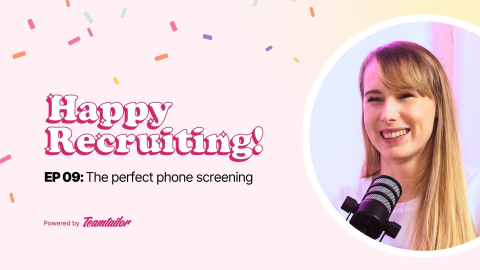The perfect phone screening


Valentina Behrouzi
I'm Val, one of the Marketing Managers here at Teamtailor, responsible for our Global marketing. I love talking about candidate experience and how we can strive to make hiring more inclusive.
There are so many ways to screen candidates, both new and old. Automated questions, video snippets, even AI. Despite this, the classic phone screen has managed to stand the test of time. In our latest episode of Happy Recruiting! Lisa sat down with Kelly Davis, Head of People at Sessions, to dive deeper into the classic phone screen and why it has remained such a pivotal step in the hiring process.
“A phone screen isn’t just about assessing a candidate. It’s about making sure they’re the right fit for your culture and values while also ensuring they leave the call more excited about the opportunity than when they started.”
For Kelly, this first conversation is more than just gathering additional information on the candidate. It’s a chance to excite them, engage them with the company and give them their first real impression of your company beyond just the job description.
Some of the reasons you might consider conducting a phone screen are
- Communication: Seeing how at ease your candidate is on the phone can be crucial for certain customer-facing roles
- Details: You can quickly gather additional information or dig deeper into the application questions
- Culture fit: Kelly doesn’t encourage hiring identical personalities, but stresses the importance of assessing whether a candidate will be happy in your company’s environment
- A deeper understanding: During the phone screening, you can pick up on things such as how much research your candidate has done, their attitude towards previous employers and their expectations of the role
Kelly also highlighted some risks associated with skipping this step of the process. According to her internal research, candidates who had not undergone a phone screening were 40% more likely to drop out or ghost during the hiring process.
“Long, complicated processes and excessive in-person stages before candidates even know if a role is right for them lead to higher dropout rates,” Kelly explains. “Most people are happy to do a 30-minute phone call at a convenient time, which is why we use scheduling tools like TeamTailor.”
Using technology in phone screening
Kelly explains that using technology helps ensure fairness. Using structured templates means every candidate is assessed using the same criteria to improve consistency.
At Sessions, they make use of scheduling tools to allow their candidates to book their own phone screens at a time that best suits them, leading to a significant reduction in no-shows. Putting the candidates in control reduces ghosting and eliminates the need for back-and-forth emails, saving a big chunk of time.
As well as this, Sessions has pre-defined skills and traits attached to each job role, as well as structured questions to assess them. Based on this, each candidate receives a score of how well they fit with the role. This ensures that hiring managers are assessing candidates based on that criteria, helping to keep things consistent and eliminate bias.
How to conduct a successful phone screen
Kelly shared with us some of the key topics she always includes when conducting a phone screening:
- Asking how familiar the candidate is with your company and brands
- Why the candidate is looking to leave their current role (this can ensure any pain points won’t be replicated in their new role)
- What’s important to them in their next role
- Their location and working requirements (do they require hybrid working or any adjustments?)
- Right to work or sponsorship requirements
- Their current notice period
- Their salary or compensation expectations
Ultimately, a well conducted phone screening can lead to many benefits. It can improve candidate experience, lead to less dropout rates, decrease turnover post-hire and lend to a better reputation for your organization.
“I’ve seen cases where candidates who hadn’t been properly screened were offered jobs, only to reveal they needed sponsorship, expected a salary £20k higher than our maximum, or misunderstood the role requirements—issues that could have been caught early on,” Kelly notes.
Kelly also makes it clear that it’s important to adapt your approach based on whether the candidate actively applied or whether they were sourced proactively (via LinkedIn, referrals etc). For fairness, ensure that the core questions remain the same, but other aspects might need to be tailored if the candidate isn’t actively seeking a new role.
Takeaways
There’s definitely some discourse around whether the phone screening should be replaced by automated solutions. However, Kelly firmly believes they remain an invaluable part of the hiring process.
“They save time in the long run by preventing mismatches and ensuring both the company and the candidate are aligned before moving forward. A well-executed phone screen can be the difference between losing a great candidate and making a successful hire.”
A successful phone screening can lead to a positive candidate experience, get the candidates engaged with your company, prepare them for later stages and most importantly, ensure honesty and transparency about the role, which can lead to higher retention rates.
If you’d like more tips and tricks from Kelly, check out her whole episode on your preferred platform below!
![]()
5 ways to improve your job postings
Your job posting is often the first impression your candidates are going to get of your company. We’ll go through a few quick and easy things you can do to improve your job postings and convert more candidates.
![]()
Preparing for the EU Pay Transparency Directive
How will the EU Pay Transparency Directive reshape the way we look at salaries? This episode covers what it means for recruiters and HR teams alike.
![]()
Mastering tech recruitment
In our latest episode of Happy Recruiting, we spoke with Diana Rose, Talent Acquisition Specialist at Boozt, for an in-depth conversation on tech recruiting. Why is there such a high demand, why is tech recruiting so unique and where does candidate experience come in?


